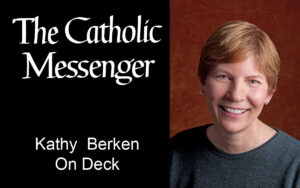By Kathy Berken
Right out of the gate, let me assure you that this column is not about politics and whistle-blowing. It’s about bringing people together to find common ground based on our core truths.
I attended a two-day retreat here in Saint Paul recently with 10 presenters, who contributed to the book “Contemplation and Community” (Crossroad Publishing). The collection of essays evolved after Tilden Edwards and Fathers Richard Rohr, Thomas Keating, and Laurence Freeman invited 20 young contemplative leaders to Snowmass, Colo., to actively envision the future of Christian contemplative life.
 Inherent in the practice of contemplation, sometimes known as centering prayer or mindfulness meditation, is listening to God in the quiet of our hearts. One of the benefits of contemplative prayer is an awakening to our core truth.
Inherent in the practice of contemplation, sometimes known as centering prayer or mindfulness meditation, is listening to God in the quiet of our hearts. One of the benefits of contemplative prayer is an awakening to our core truth.
Let me introduce one contributor, Leonard McMahon, a doctoral student at the Graduate Theological Union at U.C. Berkeley, who works through his nonprofit “Common Ground Dialogue” to bring people he calls “divergent citizens into democratic conversation,” aligning spirituality, theology and politics. His session at the retreat included an exercise based on the idea of parrhesia, a Greek word meaning “to say everything.”
In the world of personal spiritual growth, parrhesia refers to digging deep into our hearts to discover not only our core values, but our core truth. And we do this first through a regular practice of contemplation and then engaging in intense and open conversation with a close friend or spouse or our spiritual director or therapist. But what’s critical is that we have to be willing to be completely honest and authentic with our beliefs, values and feelings.
Here’s how it works. One person is the speaker and the other will persist with simple questions until both are satisfied that the speaker has revealed her core truth about a particular matter. The exchange might go something like this: “I believe that honesty is the best policy.” “Why?” “Because it’s important.” “Why is it important?” “Because you can’t have people lying all the time.” “Why not?” “Because you won’t know who to trust.” “Why is that important to you?” “Because a lack of trust can cause all sorts of problems.” “Why do you care?” “Because I don’t want to live in a world that is chaotic and distrustful.” “Why not?” “Because I just don’t, that’s why!”
And by this time, you can probably feel the frustration! But we still have not gotten to the speaker’s core truth. The questions should continue until the person expresses a deeply held emotion based on some experience. The questioner asks for a story about honesty, perhaps from her childhood, and how that felt. If the speaker begins to open up about, let’s say, how she was lied to by a parent and how hurt and abandoned she felt, we are getting to the core truth. Whenever she is lied to now, she feels it physically and reverts subconsciously to that early experience, feeling the pain of abandonment and isolation. She loses her sense of belonging and security all over again.
The core value here is honesty. The core truth is that she was deeply hurt as a child when someone was dishonest with her.
The purpose of the exercise is to dig deep, learn some core truths about ourselves and each other, to bring people together on common ground, even those who have very different values from each other. We may discover in the end that we are more alike than we are different because our core truths may be very much the same. This is a key to community and peacemaking.
It gives me great hope to see older contemplatives passing the torch of wisdom on to the younger generation.
(Kathy Berken is a spiritual director and retreat leader in St. Paul, Minn. She lived and worked at The Arch, L’Arche in Clinton (1999-2009) and is author of “Walking on a Rolling Deck: Life on the Ark, stories from The Arch.)











